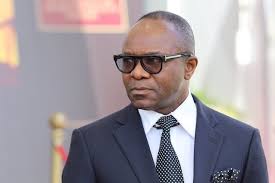Nigeria’s economic growth indices were indicated to have slowed in the first quarter in spite of rising crude oil prices in the international market.
The National Bureau of Statistics (NBS) report indicated that the Gross Domestic Product (GDP), expanded 1.95 per cent in the three months through March from a year earlier, in comparison with a revised 2.1 per cent in the fourth quarter.
The Bureau noted that while oil revenue accounts for only about 10 per cent of GDP, oil generates the bulk of government revenue for Nigeria, and helps to prop up the economy. Output rose to two million barrels a day in the quarter, the highest since the first quarter of 2016, according to the statistics bureau. The non-oil sector expanded 0.8 per cent in the quarter, NBS highlighted.
The GDP expansion lags the 2.6 per cent median estimate in a Bloomberg survey.
The first quarter’s numbers “are surprisingly weak,” Michael Famoroti, chief economist, Vetiva Capital Management Ltd., said by email.
While this could make a case for the Monetary Policy Committee to ease borrowing costs to try and stimulate growth, “the best way to do this would be to further engender price and exchange-rate stability. Therefore, we do not expect the MPC to move for a rate cut on the back of these GDP figures,” he said.
The Central Bank of Nigeria (CBN) has kept its key rate at a record 14 per cent since July 2016.
CBN Governor, Godwin Emefiele will announce the Monetary Policy Committee’s decision on Tuesday and all but four of the 15 economists in a Bloomberg survey said the panel will keep borrowing costs unchanged.
While growth slowed, GDP has now expanded for four straight quarters.
Nigeria vies with South Africa to be the continent’s largest contracted in 2016. It’s gaining some traction and a record 2018 budget that the National Assembly approved last week will also support this.
The International Monetary Fund (IMF) forecasts growth will accelerate to 2.1 per cent this year from 0.8 per cent in 2017.
Meanwhile, the Nigerian Governors Forum (NGF) has complained of shortfall in NNPC revenue payment to the federal government, and also, questioned the claimed figure spent on payment of petrol subsidy by NNPC without appropriation by the National Assembly.

 Health & Fitness2 days ago
Health & Fitness2 days ago
 Comments and Issues1 week ago
Comments and Issues1 week ago
 Featured6 days ago
Featured6 days ago
 Education1 week ago
Education1 week ago
 Business1 week ago
Business1 week ago
 Aviation4 days ago
Aviation4 days ago
 Business6 days ago
Business6 days ago
 Crime1 week ago
Crime1 week ago

